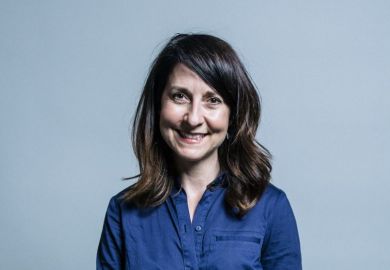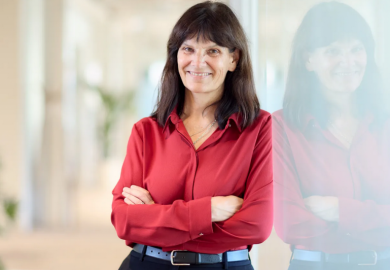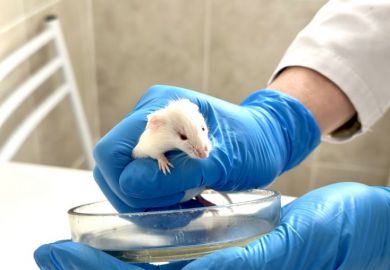Academic science conferences have a distinctive structure, a warm envelope of familiarity that gives a reassuring - if bland - environment more or less wherever in the world you pitch up at one.
Except SciFoo, that is. This wildly unusual event is now in its third year and - as I can testify - provides a very different user experience.
When I received the emailed invitation my first thought was, "Yeah, right, who are they trying to kid?", and I hovered the mouse pointer over the delete button. Why would anyone invite me, a poor and relatively minor character in the broad canvas of higher education, to one of the most exciting, sexy events in the research calendar?
But then there were the "what ifs". What if the email was real? What if they really wanted me to attend? What if I passed up what could turn into the trip of a lifetime?
I had already read blogs about Science Foo Camp - to give it its full name; I even knew someone who had attended. Fighting against the conspiracy theorist and computer geek in me, I took a closer look at the invitation.
A rummage through the email header revealed only that it came from a server located at one of the three sponsors of the event. This wasn't quite enough to satisfy my deeply cynical nature, so I bounced the mail to my friend at Nature Publishing who had attended the year before, pointing out that someone was playing a cruel joke on a simple country lad.
His reply was almost instantaneous. Yes, it is real - honest. Yes, you must go - it is an incredible experience.
The concept of SciFoo is brilliantly simple, with an elegance verging on genius. You invite 200 wildly varied people from around the world with an acknowledged personal commitment to science to a venue in the middle of the grey suburban blur that is Silicon Valley, California. You provide them with accommodation at a local hotel, food, meeting rooms and logistical support - then you instruct them to go off and talk about science for the weekend.
Yes, it is a type of conference, but with one vital twist: there is no programme, no fixed agenda beyond the bare bones of meal breaks, bar openings and transport to and from the hotel. Nothing important gets decided about what will be discussed until everyone meets up on the Friday evening.
It describes itself as an "un-conference", and the idea behind it stems from the widely held belief that the best part of any conference is the spontaneous discussion and networking that happens outside the programmed event, usually late at night in the bar when everyone has relaxed, had a few drinks and let their hair down.
Reading blog entries from previous years, it was clear that the delegates - or "campers" in the vernacular - had had a tremendous time and that they were a wide-ranging bunch that included some seriously clever, influential and famous people.
This was reinforced when the SciFoo Wiki published the list of this year's campers, which featured at least four Nobel laureates, a bunch of prominent media names, billionaire industry gurus and enough research leaders to start your own university.
I instantly succumbed to a Wayne's World sense of deep unworthiness. Fortunately, I was able to spot a few others who, like me, appeared to be there for the weird stuff they have published - science fiction stories, in my case - rather than their raw intellectual power.
Arriving at the almost mythically cool Googleplex in Mountain View - Google's Silicon Valley headquarters - the registration scrum seemed familiar (including goody bag and T-shirt), but the name badges revealed the plot.
Big first name, small second name, no honorific titles and no affiliation. This turned out to be crucial: what you have to contribute is much more important than who you are. When the chance came to introduce yourself to the assembled throng, you were restricted to three words: a rule enforced with a large gong.
After a briefing on etiquette, a beer and a buffet, the delegate group descended mob-handed on the agreeably low-technology noticeboards that formed the blank schedule. Prospective speakers networked in real time to build sessions with other like-minded individuals and then grab a room of feasible size.
With multiple parallel sessions running, it was inevitable that you would miss far more than you could ever hope to attend. The decisions were often painful: should I see the world-famous cosmologist or the planet's leading science comedian? Comedy won and I was rewarded with an astonishingly funny stand-up session by Californian Brian Malow.
Typical joke: "I went into an Italian restaurant and saw that they kept pasta and antipasta in the same display cabinet. Are they freakin' nuts?" I had never seen so many scientists helpless with mirth.
I wandered into an absorbing talk by astronomer and Jesuit Brother Guy Consolmagno about the Vatican Observatory and the meteorite collection in his charge, along with some lesser-known contextual stuff about Galileo and the role of the Catholic Church in research and higher education.
Meanwhile, on the terrace outside the main building a pre-production flying car - or "transitional vehicle" - was furling and unfurling its wings before a delighted audience. Alongside, two high-performance electric cars were showing how out of date my views on the technology were.
Guided tours - no pictures inside - of the Google facility demonstrated the benefits of a different industry culture: no coder works more than 100ft from food and coffee (all free, except for the really wicked stuff, which is charged on a "badness" index). Conspicuous use is made of non-traditional business resources such as the beach basketball court and vegetable garden, even at the weekend.
In the lobby of one Google building, a model of X-Prize-winning SpaceShipOne hung in a stairwell, while outside, the skeleton of a T. rex stalked the shrubbery, adding more than a hint of Hollywood to the proceedings.
With seriously talented science researchers, purveyors of advanced technology, original thinkers and people of extraordinary vision present, the discussions were free, wild and radical. Because of the wide range of backgrounds, no one felt awkward about asking really naive questions; they simply pitched in. Sadly, the breadth of discussion was so great that there were entire areas I never even managed to touch on - a common frustration among the campers.
The sessions were intense - the spaces between them more so. Long meal and coffee breaks saw a rash of impromptu events such as modelling swarming behaviours in robots, and a round of caffeine-fuelled networking by people desperate to meet as many fellow campers as possible before we ran out of time.
Organisation was the key to getting the best out of the meeting, and the logistics were managed with charm and humour by a party of young folk from Google and the other sponsors, publishers O'Reilly and science journal Nature. It was a delight to see so many wildly intelligent, keen, sparky people have such a good time while doing their job so effectively.
The concepts discussed at SciFoo were big, as were some of the projects pitched for discussion, criticism and support. The sheer weight of expertise in such a small space meant that if the skill you needed wasn't in the same seminar room, it wasn't many feet away.
Take, for example, the Beagle Project: a research and public engagement initiative to celebrate the 200th anniversary of the birth of Charles Darwin. The plan is to build a replica HMS Beagle, beginning in 2009, and use it as the focus for a series of research projects linked to school and community events during a circumnavigation that loosely mirrors the original voyage.
Those who attended the briefing by Beagle Project director of science Karen James pitched in with offers of technical, operational and financial help. One contributor nipped out of the room to grab the email address of a potential benefactor from a mutual friend.
Then there were the space-based projects. With the Nasa Ames Research Centre just around the corner - literally - it wasn't a surprise that a strong contingent of space interests was present. This included at least one International Space Station astronaut and centre director Pete Worden. Aside from the practical experience that this contributed to otherwise largely theoretical discussions, it was absorbing and humbling to hear first-hand accounts of programme management processes in really big projects where human life is routinely at stake.
At the end of the third day, crazed from lack of sleep and overexposure to brilliant, exciting, intriguing people, I sat and looked at my scattered notes and the pile of treasured business cards with something close to despair.
Not even the strongest coffee the hotel offered at breakfast ("Zulu Blend - Coffee for Warriors") could supply me with sufficient caffeine to let me begin to summarise what I had experienced.
It took me a couple of weeks, and an almost spiritual retreat to the wilds of Yosemite, even to start to build a coherent picture of this enormously impressive event. But bear in mind that each attendee was asked to nominate three people to attend a future Science Foo. Who knows, next year it might be you.
Register to continue
Why register?
- Registration is free and only takes a moment
- Once registered, you can read 3 articles a month
- Sign up for our newsletter
Subscribe
Or subscribe for unlimited access to:
- Unlimited access to news, views, insights & reviews
- Digital editions
- Digital access to THE’s university and college rankings analysis
Already registered or a current subscriber?



